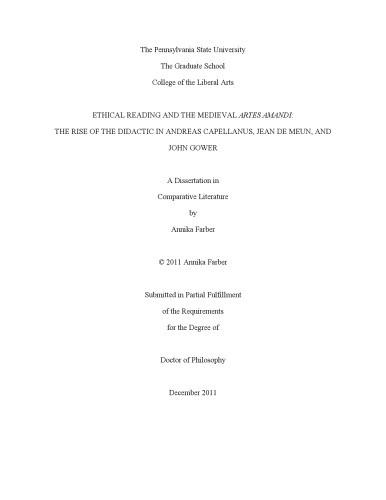Product desciption
Ethical Reading And The Medieval Artes Amandi The Rise Of The Didactic In Andreas Capellanus Jean De Meun And John Gower Thesis Annika Farber by Annika Farber instant download after payment.
Ovid, in his Ars amatoria, adopts the didactic framework in order to elevate the tradition of Latin love elegy and make a name for himself as a poet. In contrast, three of his most famous medieval successors—Andreas Capellanus, Jean de Meun, and John Gower—invert the balance, exploiting the subject of love to instruct their readers in other topics, such as religion, philosophy, and morality. This shift in balance is related to the practice of ―ethical reading,‖ which emerged in medieval grammatica as a way of approaching classical authors by emphasizing the ethical (and thus educational) potential of their texts. Previous scholarship has established the ethical focus of medieval grammar education and the ways in which that ethical focus influenced medieval readings of classical texts, but this scholarship has rarely continued on to discuss the influence of grammar education on medieval authors. Andreas, Jean, and Gower first encountered imaginative literature in the medieval curriculum, where the texts of classical authors were used to teach students the Latin language. In the grammar classroom, they would have been taught interpretive methods that trained them to identify the utility of what they were reading, whether that utility was conceived of in philological, ethical, philosophical, or even theological terms. Conditioned to read imaginative literature for these didactic purposes, Andreas, Jean, and Gower discovered, in Ovid‘s Ars amatoria, a text that used love as a platform for didacticism, and a model around which to build their own literary inventions. The literary works that they created—Andreas‘s De amore (late 12th c.), Jean‘s continuation of Roman de la Rose (late 13th c.), and Gower‘s Confessio Amantis (late 14th c.)—are dense, challenging, and multilayered texts that illustrate the process of learning through reading and dialogue, and use the literary discourse of love to teach their students the art of reading.


